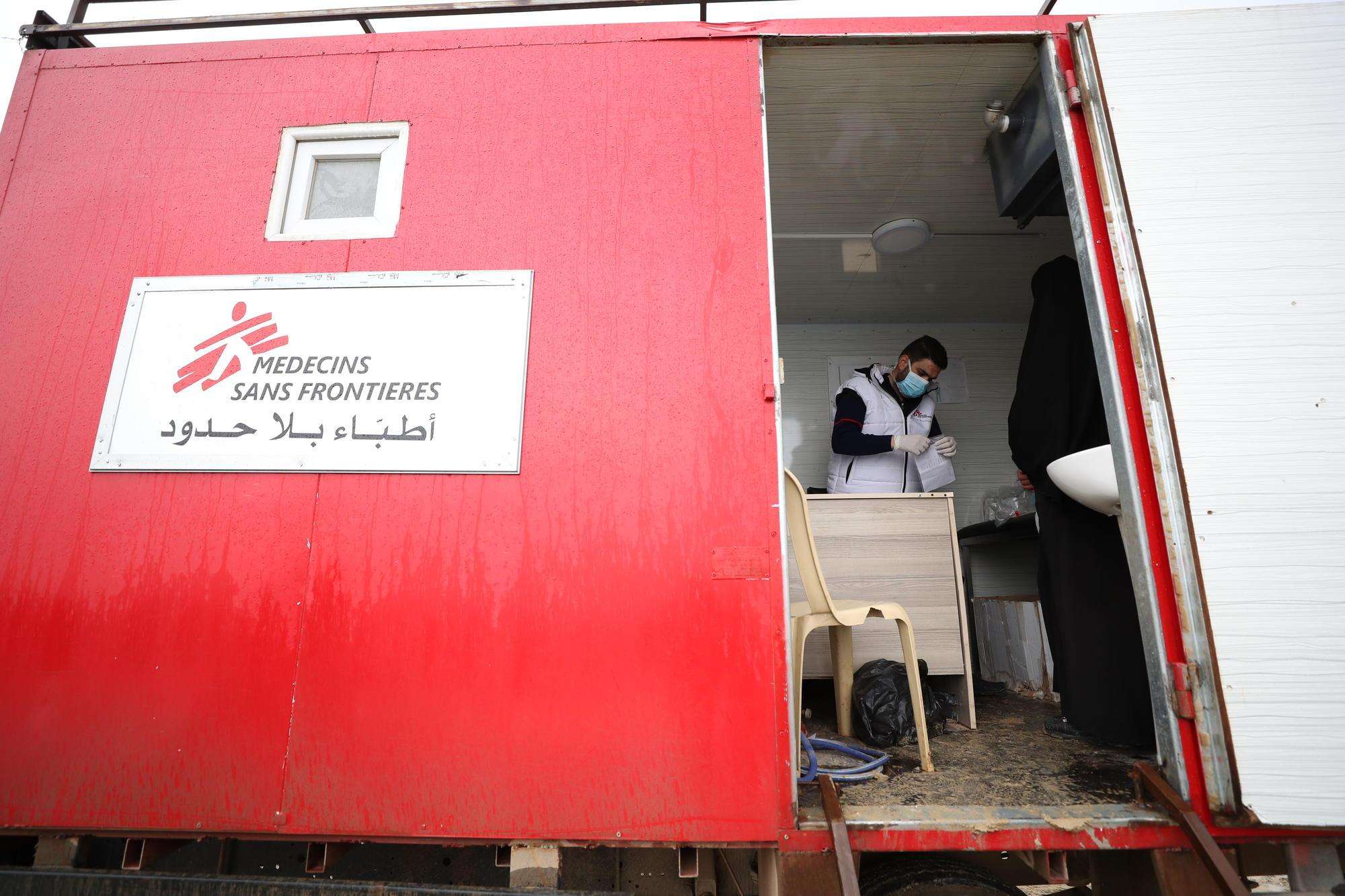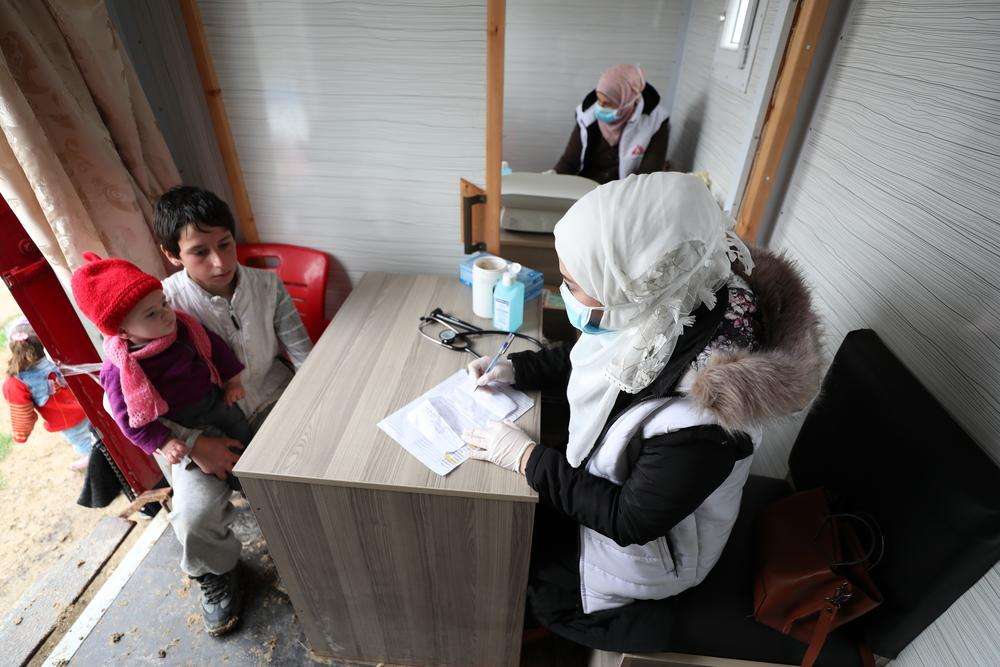On Wednesday, April 8, 2020, a hospital co-managed by Doctors Without Borderes/Médecin Sans Frontières (MSF) in Idlib, northwestern Syria, received a 65-year-old man suffering from a heart condition and showing symptoms of COVID-19, including acute respiratory distress and fever. Upon arrival he was immediately admitted in an observation tent outside the hospital, set up by MSF as part of its COVID-19 response. The team provided him with oxygen and gave him the best medical care possible while waiting for an ambulance to refer him to a dedicated structure for testing and follow-up, in accordance with referral plans agreed to by the World Health Organization (WHO) and health actors in the region.
The medical staff then tried to organize his referral by contacting two facilities, one designated by the World Health Organization (WHO) and the other by local health authorities to treat suspected or confirmed COVID-19 cases. However, neither of the two hospitals could accommodate him. The necessary supplies for his treatment were not available in one of the medical facilities and the other one was not yet ready to admit suspected or confirmed COVID-19 patients. The ambulance service, contacted for the referral, was also not yet ready to handle the patient’s transfer.
“Despite these different refusals, the medical team on site kept looking for solutions for this patient,” said Cristian Reynders, MSF field coordinator for northwestern Syria. An hour after the patient’s arrival at the facility the WHO's disease surveillance team came to collect a test sample that confirmed, 24 hours later, that the patient did not have COVID-19.
Later that day, another ambulance was mobilized to transport the patient to the first hospital contacted, which had done its utmost, in the meantime, to find the necessary supplies to be able to admit him, despite facing shortages—even of protective equipment—to be able to treat such patients.
“This course of events demonstrated two important lessons—one that we knew and another that we have been concerned about,” said Reynders. “It is well-known that the health system in Idlib is completely overstretched and low on supplies. And this already challenging situation to keep people healthy will be overrun if COVID-19 spreads here. Just a single suspected case has shown that this region will struggle to cope in the face of this pandemic.”
Since the beginning of the COVID-19 pandemic, MSF has been reviewing triage systems and patient flow to ensure fast detection of potential COVID-19 cases in some of the hospitals and health centers it supports in Idlib governorate. These measures are taken to place symptomatic people under observation until an ambulance arrives to take them to a dedicated structure for tests and follow-up.
MSF has also set up hygiene committees and reinforced them with additional staff. The organization has also strengthened infection prevention and control measures in its facilities, equipped staff with the needed protective equipment, and donated protective equipment for staff and additional supplies for facilities to cope with an increased number of consultations. In some of the camps where MSF works, the organization has also spread awareness messages, adapted the triage system of its mobile clinics, implemented social distancing measures, and reviewed protocols to be able to also continue non-food item distributions and health care services while reducing the risk of contamination.
“We’re all doing the best we can with the means available to us and the context that we need to deal with,” said Reynders. “But our inability to scale up our activities in Idlib and to do more in the face of this health emergency is a daily reality and could have dramatic consequences. We renew our calls on the relevant Turkish authorities to facilitate the urgent transit of essential supplies and access of staff into Northwest Syria, in order to allow the scale-up of our humanitarian and medical response there.”
On Thursday, April 9, 2020, the patient initially suspected of having COVID-19 died of heart failure.
“We are saddened by this patient’s death. And although the test came back negative, this experience has shown that the region is not ready to cope with the pandemic. Urgent efforts are needed to be ready to face the coming storm,” said Reynders.
Six more patients with COVID-19 symptoms have since arrived at MSF’s co-managed hospital this week. The hospital admission system has been adapted to screen, detect, and refer patients showing COVID-19 symptoms in order to protect medical staff and other patients from infection. But more needs to be done.
“Over the past months and years, MSF has been vocal about the critical situation in northwest Syria and about the limitations that we, and other medical actors, face to properly respond to the needs and offer adequate treatment to the patients,” said Reynders. “Today, we struggle to get supplies and human resources into northwest Syria and this is massively hampering our capacity to scale up our response. We coordinate with other actors on the ground, but many are facing similar challenges. Yet, in our activities, we are constantly reminded of how medical assistance is urgently needed—even more so in the face of a pandemic.”
Across northwestern Syria MSF teams provide maternal health care, general health care, and treatment for noncommunicable diseases through mobile clinics. They distribute relief items and improve water and sanitation systems. They also support regular vaccination activities in two vaccination centers and one hospital and through mobile clinic services.
MSF also runs a specialized burns unit that provides surgery, skin grafts, dressings, physiotherapy, and psychological support. MSF provides distance support to primary and secondary health care in several hospitals and clinics around Idlib and Aleppo and has co-management partnerships with three hospitals.
In northeastern Syria MSF’s medical programs across Raqqa, Hasakeh, and Aleppo governorates continue. MSF runs activities in Al Raqqa, Kobane/Ain Al Arab, Al Hol camp, Washokani camp, and Tal Kochar/Yaroubiyah, and supports local health authorities with COVID-19 outbreak preparedness.
To ensure independence from political pressures, MSF receives no government funding for its work in Syria.





